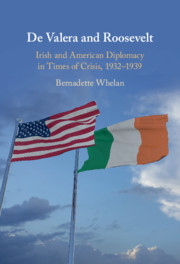Refine search
Actions for selected content:
10 results
The Politics of Promotion in China’s Foreign Policy Bureaucracy
-
- Journal:
- The China Quarterly / Volume 263 / September 2025
- Published online by Cambridge University Press:
- 26 June 2025, pp. 776-795
- Print publication:
- September 2025
-
- Article
-
- You have access
- Open access
- HTML
- Export citation
7 - Pakistan
-
- Book:
- Bureaucracies at War
- Published online:
- 05 December 2024
- Print publication:
- 27 June 2024, pp 226-258
-
- Chapter
- Export citation
5 - Brazil’s Great Transformation
- from Part II - Colonization Companies and the Colono Trade
-
- Book:
- Peopling for Profit in Imperial Brazil
- Published online:
- 26 September 2024
- Print publication:
- 13 June 2024, pp 152-184
-
- Chapter
-
- You have access
- Open access
- HTML
- Export citation
8 - Ceasefires
-
- Book:
- Redefining Ceasefires
- Published online:
- 11 May 2023
- Print publication:
- 25 May 2023, pp 157-170
-
- Chapter
- Export citation
Worse than Hitler and Nazi Germany: Swiss Diplomats and the Cultural Revolution
-
- Journal:
- Journal of Chinese History / Volume 8 / Issue 1 / January 2024
- Published online by Cambridge University Press:
- 22 November 2022, pp. 73-94
-
- Article
-
- You have access
- Open access
- HTML
- Export citation
4 - Dr No in Switzerland
-
- Book:
- China's European Headquarters
- Published online:
- 21 April 2022
- Print publication:
- 28 April 2022, pp 194-269
-
- Chapter
- Export citation

De Valera and Roosevelt
- Irish and American Diplomacy in Times of Crisis, 1932–1939
-
- Published online:
- 15 December 2020
- Print publication:
- 10 December 2020
1 - Introduction
- from Part I - Soft Diplomacy and the Diplomat
-
- Book:
- De Valera and Roosevelt
- Published online:
- 15 December 2020
- Print publication:
- 10 December 2020, pp 3-24
-
- Chapter
- Export citation
The constitutions of international organisations: How institutional design seeks to foster diplomatic deliberation
-
- Journal:
- Global Constitutionalism / Volume 8 / Issue 3 / November 2019
- Published online by Cambridge University Press:
- 27 August 2019, pp. 571-604
-
- Article
-
- You have access
- Open access
- HTML
- Export citation
14 - Diplomats as Power Brokers
- from Part IV - Agents and Practices
-
-
- Book:
- Securing Europe after Napoleon
- Published online:
- 25 January 2019
- Print publication:
- 07 February 2019, pp 271-287
-
- Chapter
- Export citation
